Lobbying by Philip Morris: Influence on Tobacco Control Policies
VerifiedAdded on 2023/06/11
|11
|3725
|99
AI Summary
This essay explores the lobbying activities of Philip Morris, a leading tobacco manufacturer, against tobacco control policies. It examines the reasons behind corporation lobbying, the implications for societal stakeholders, and the policy implementation process. The essay also discusses the controversies surrounding the packaging process and the qualities of the product used by the company.
Contribute Materials
Your contribution can guide someone’s learning journey. Share your
documents today.
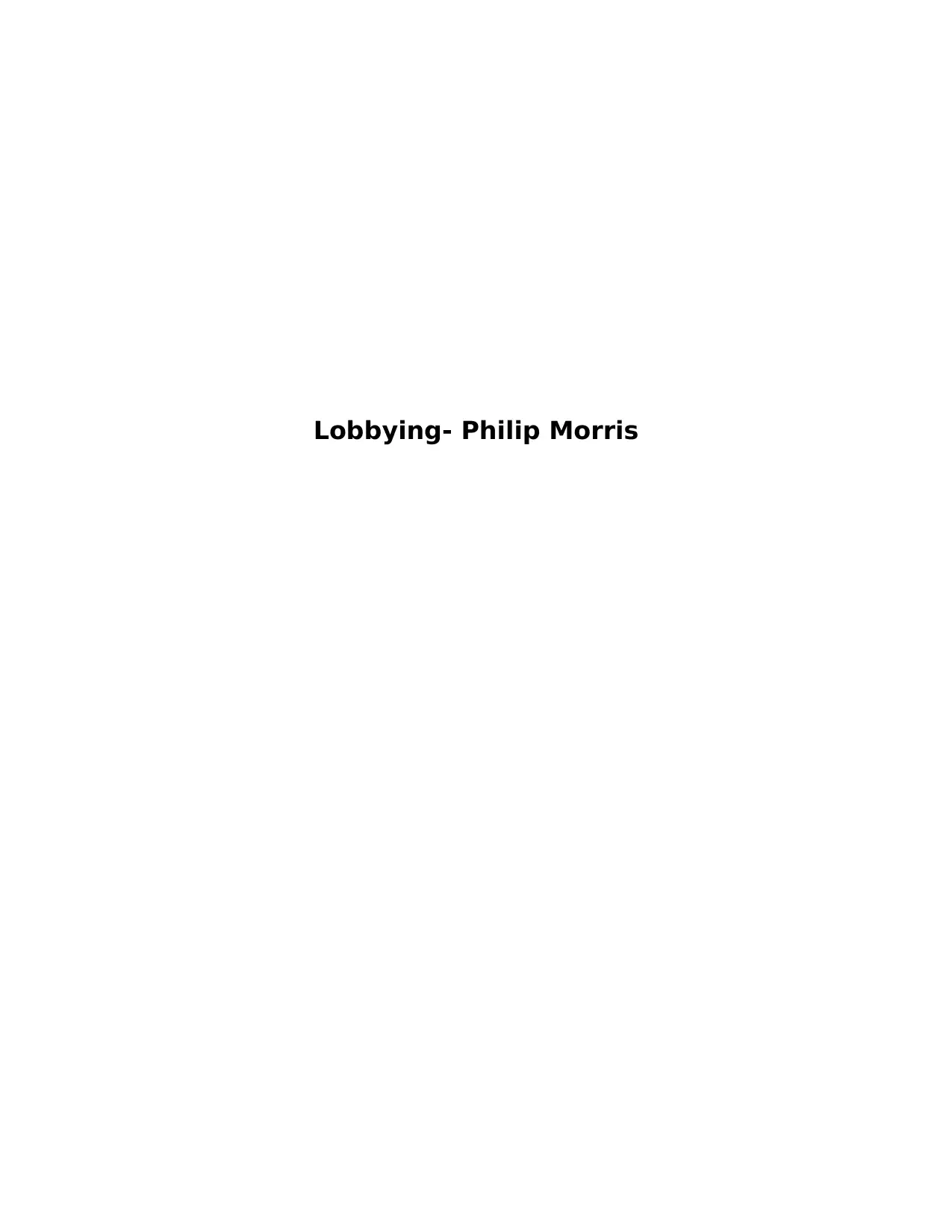
Lobbying- Philip Morris
Secure Best Marks with AI Grader
Need help grading? Try our AI Grader for instant feedback on your assignments.
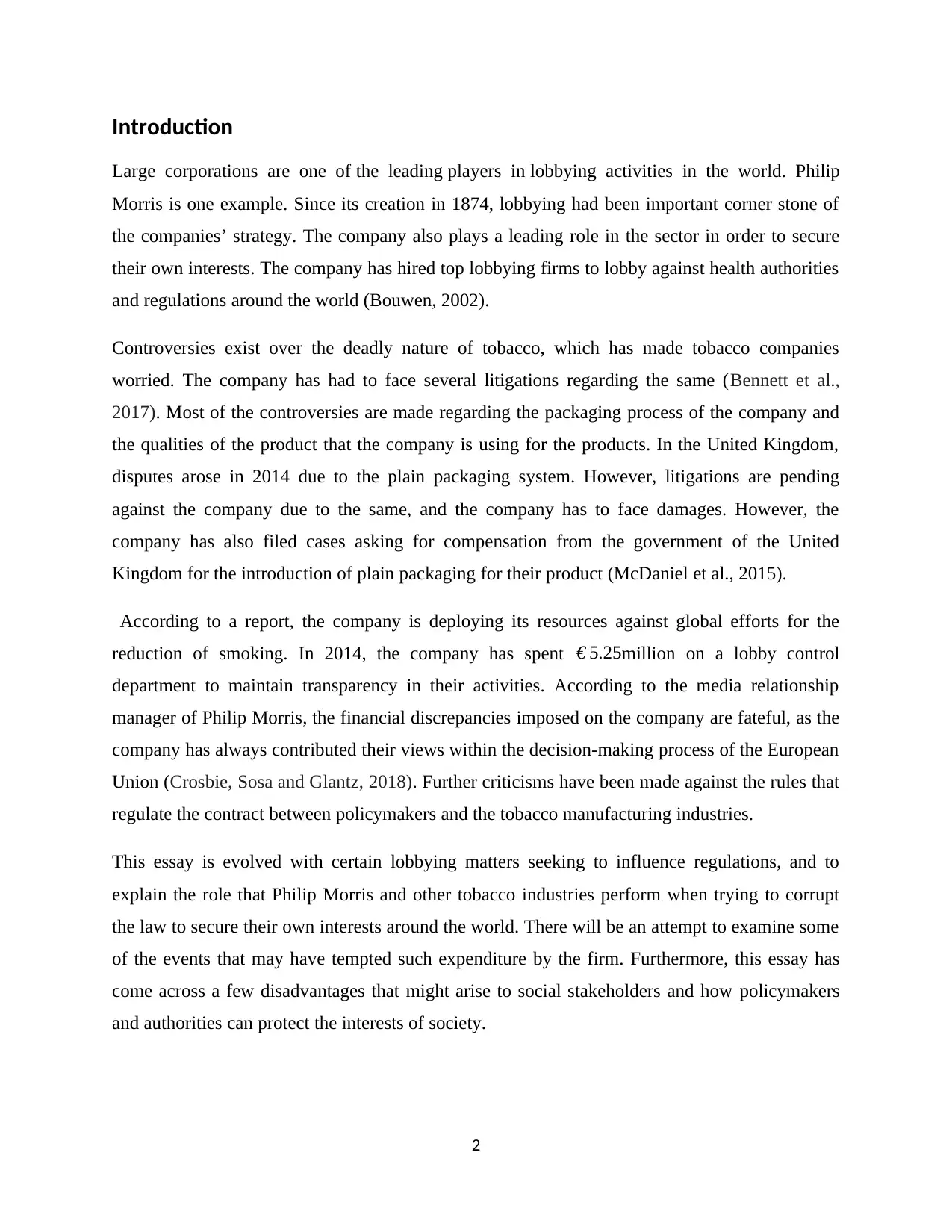
Introduction
Large corporations are one of the leading players in lobbying activities in the world. Philip
Morris is one example. Since its creation in 1874, lobbying had been important corner stone of
the companies’ strategy. The company also plays a leading role in the sector in order to secure
their own interests. The company has hired top lobbying firms to lobby against health authorities
and regulations around the world (Bouwen, 2002).
Controversies exist over the deadly nature of tobacco, which has made tobacco companies
worried. The company has had to face several litigations regarding the same (Bennett et al.,
2017). Most of the controversies are made regarding the packaging process of the company and
the qualities of the product that the company is using for the products. In the United Kingdom,
disputes arose in 2014 due to the plain packaging system. However, litigations are pending
against the company due to the same, and the company has to face damages. However, the
company has also filed cases asking for compensation from the government of the United
Kingdom for the introduction of plain packaging for their product (McDaniel et al., 2015).
According to a report, the company is deploying its resources against global efforts for the
reduction of smoking. In 2014, the company has spent € 5.25million on a lobby control
department to maintain transparency in their activities. According to the media relationship
manager of Philip Morris, the financial discrepancies imposed on the company are fateful, as the
company has always contributed their views within the decision-making process of the European
Union (Crosbie, Sosa and Glantz, 2018). Further criticisms have been made against the rules that
regulate the contract between policymakers and the tobacco manufacturing industries.
This essay is evolved with certain lobbying matters seeking to influence regulations, and to
explain the role that Philip Morris and other tobacco industries perform when trying to corrupt
the law to secure their own interests around the world. There will be an attempt to examine some
of the events that may have tempted such expenditure by the firm. Furthermore, this essay has
come across a few disadvantages that might arise to social stakeholders and how policymakers
and authorities can protect the interests of society.
2
Large corporations are one of the leading players in lobbying activities in the world. Philip
Morris is one example. Since its creation in 1874, lobbying had been important corner stone of
the companies’ strategy. The company also plays a leading role in the sector in order to secure
their own interests. The company has hired top lobbying firms to lobby against health authorities
and regulations around the world (Bouwen, 2002).
Controversies exist over the deadly nature of tobacco, which has made tobacco companies
worried. The company has had to face several litigations regarding the same (Bennett et al.,
2017). Most of the controversies are made regarding the packaging process of the company and
the qualities of the product that the company is using for the products. In the United Kingdom,
disputes arose in 2014 due to the plain packaging system. However, litigations are pending
against the company due to the same, and the company has to face damages. However, the
company has also filed cases asking for compensation from the government of the United
Kingdom for the introduction of plain packaging for their product (McDaniel et al., 2015).
According to a report, the company is deploying its resources against global efforts for the
reduction of smoking. In 2014, the company has spent € 5.25million on a lobby control
department to maintain transparency in their activities. According to the media relationship
manager of Philip Morris, the financial discrepancies imposed on the company are fateful, as the
company has always contributed their views within the decision-making process of the European
Union (Crosbie, Sosa and Glantz, 2018). Further criticisms have been made against the rules that
regulate the contract between policymakers and the tobacco manufacturing industries.
This essay is evolved with certain lobbying matters seeking to influence regulations, and to
explain the role that Philip Morris and other tobacco industries perform when trying to corrupt
the law to secure their own interests around the world. There will be an attempt to examine some
of the events that may have tempted such expenditure by the firm. Furthermore, this essay has
come across a few disadvantages that might arise to social stakeholders and how policymakers
and authorities can protect the interests of society.
2
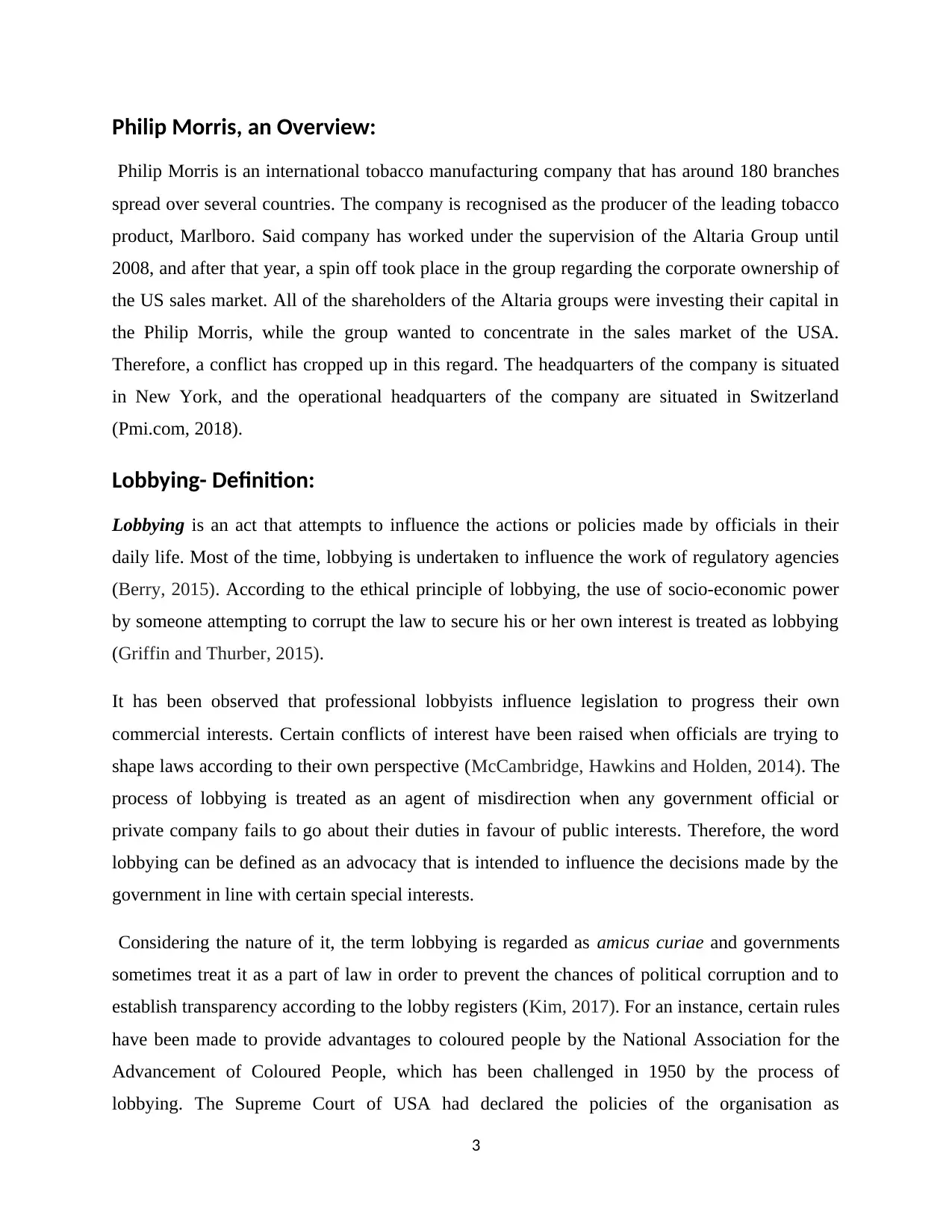
Philip Morris, an Overview:
Philip Morris is an international tobacco manufacturing company that has around 180 branches
spread over several countries. The company is recognised as the producer of the leading tobacco
product, Marlboro. Said company has worked under the supervision of the Altaria Group until
2008, and after that year, a spin off took place in the group regarding the corporate ownership of
the US sales market. All of the shareholders of the Altaria groups were investing their capital in
the Philip Morris, while the group wanted to concentrate in the sales market of the USA.
Therefore, a conflict has cropped up in this regard. The headquarters of the company is situated
in New York, and the operational headquarters of the company are situated in Switzerland
(Pmi.com, 2018).
Lobbying- Definition:
Lobbying is an act that attempts to influence the actions or policies made by officials in their
daily life. Most of the time, lobbying is undertaken to influence the work of regulatory agencies
(Berry, 2015). According to the ethical principle of lobbying, the use of socio-economic power
by someone attempting to corrupt the law to secure his or her own interest is treated as lobbying
(Griffin and Thurber, 2015).
It has been observed that professional lobbyists influence legislation to progress their own
commercial interests. Certain conflicts of interest have been raised when officials are trying to
shape laws according to their own perspective (McCambridge, Hawkins and Holden, 2014). The
process of lobbying is treated as an agent of misdirection when any government official or
private company fails to go about their duties in favour of public interests. Therefore, the word
lobbying can be defined as an advocacy that is intended to influence the decisions made by the
government in line with certain special interests.
Considering the nature of it, the term lobbying is regarded as amicus curiae and governments
sometimes treat it as a part of law in order to prevent the chances of political corruption and to
establish transparency according to the lobby registers (Kim, 2017). For an instance, certain rules
have been made to provide advantages to coloured people by the National Association for the
Advancement of Coloured People, which has been challenged in 1950 by the process of
lobbying. The Supreme Court of USA had declared the policies of the organisation as
3
Philip Morris is an international tobacco manufacturing company that has around 180 branches
spread over several countries. The company is recognised as the producer of the leading tobacco
product, Marlboro. Said company has worked under the supervision of the Altaria Group until
2008, and after that year, a spin off took place in the group regarding the corporate ownership of
the US sales market. All of the shareholders of the Altaria groups were investing their capital in
the Philip Morris, while the group wanted to concentrate in the sales market of the USA.
Therefore, a conflict has cropped up in this regard. The headquarters of the company is situated
in New York, and the operational headquarters of the company are situated in Switzerland
(Pmi.com, 2018).
Lobbying- Definition:
Lobbying is an act that attempts to influence the actions or policies made by officials in their
daily life. Most of the time, lobbying is undertaken to influence the work of regulatory agencies
(Berry, 2015). According to the ethical principle of lobbying, the use of socio-economic power
by someone attempting to corrupt the law to secure his or her own interest is treated as lobbying
(Griffin and Thurber, 2015).
It has been observed that professional lobbyists influence legislation to progress their own
commercial interests. Certain conflicts of interest have been raised when officials are trying to
shape laws according to their own perspective (McCambridge, Hawkins and Holden, 2014). The
process of lobbying is treated as an agent of misdirection when any government official or
private company fails to go about their duties in favour of public interests. Therefore, the word
lobbying can be defined as an advocacy that is intended to influence the decisions made by the
government in line with certain special interests.
Considering the nature of it, the term lobbying is regarded as amicus curiae and governments
sometimes treat it as a part of law in order to prevent the chances of political corruption and to
establish transparency according to the lobby registers (Kim, 2017). For an instance, certain rules
have been made to provide advantages to coloured people by the National Association for the
Advancement of Coloured People, which has been challenged in 1950 by the process of
lobbying. The Supreme Court of USA had declared the policies of the organisation as
3
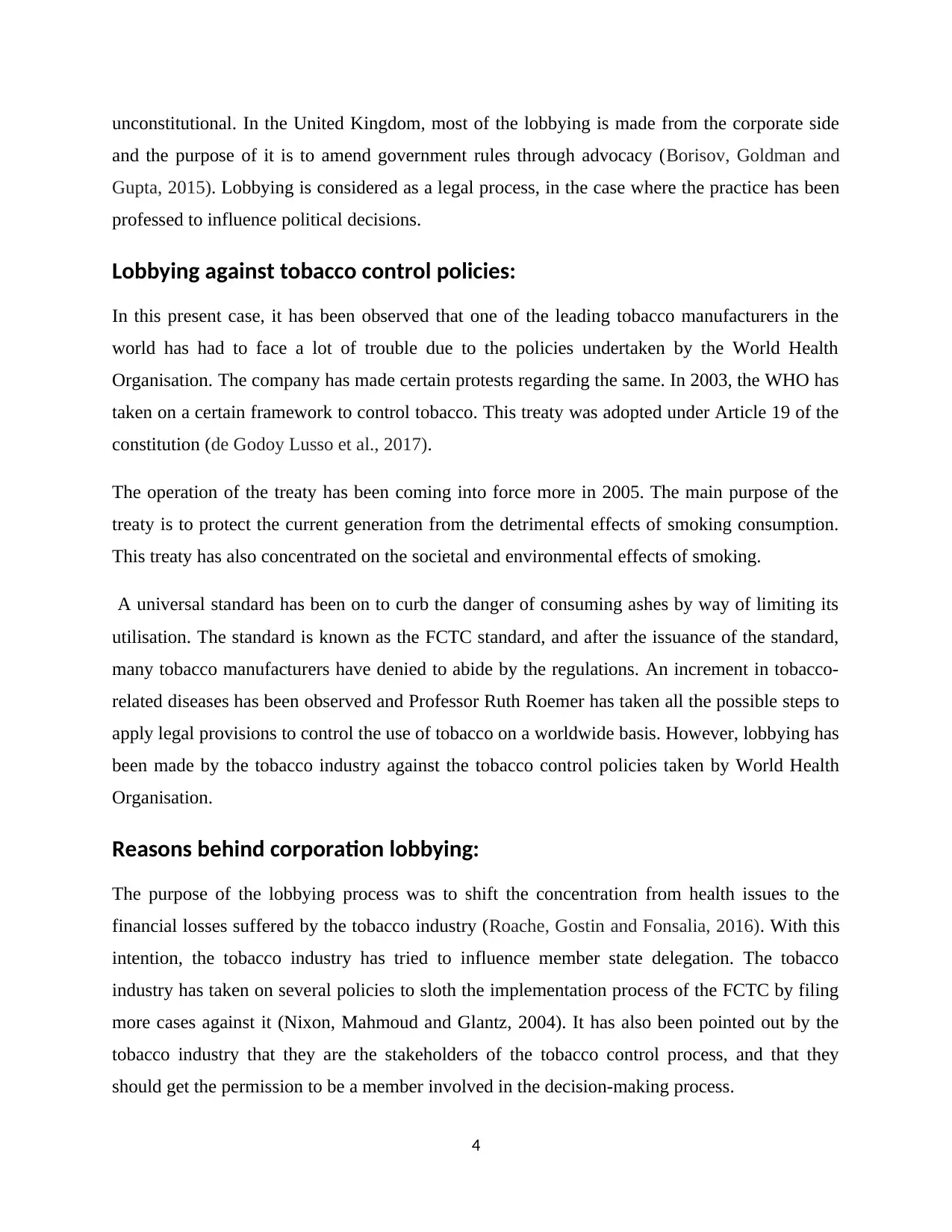
unconstitutional. In the United Kingdom, most of the lobbying is made from the corporate side
and the purpose of it is to amend government rules through advocacy (Borisov, Goldman and
Gupta, 2015). Lobbying is considered as a legal process, in the case where the practice has been
professed to influence political decisions.
Lobbying against tobacco control policies:
In this present case, it has been observed that one of the leading tobacco manufacturers in the
world has had to face a lot of trouble due to the policies undertaken by the World Health
Organisation. The company has made certain protests regarding the same. In 2003, the WHO has
taken on a certain framework to control tobacco. This treaty was adopted under Article 19 of the
constitution (de Godoy Lusso et al., 2017).
The operation of the treaty has been coming into force more in 2005. The main purpose of the
treaty is to protect the current generation from the detrimental effects of smoking consumption.
This treaty has also concentrated on the societal and environmental effects of smoking.
A universal standard has been on to curb the danger of consuming ashes by way of limiting its
utilisation. The standard is known as the FCTC standard, and after the issuance of the standard,
many tobacco manufacturers have denied to abide by the regulations. An increment in tobacco-
related diseases has been observed and Professor Ruth Roemer has taken all the possible steps to
apply legal provisions to control the use of tobacco on a worldwide basis. However, lobbying has
been made by the tobacco industry against the tobacco control policies taken by World Health
Organisation.
Reasons behind corporation lobbying:
The purpose of the lobbying process was to shift the concentration from health issues to the
financial losses suffered by the tobacco industry (Roache, Gostin and Fonsalia, 2016). With this
intention, the tobacco industry has tried to influence member state delegation. The tobacco
industry has taken on several policies to sloth the implementation process of the FCTC by filing
more cases against it (Nixon, Mahmoud and Glantz, 2004). It has also been pointed out by the
tobacco industry that they are the stakeholders of the tobacco control process, and that they
should get the permission to be a member involved in the decision-making process.
4
and the purpose of it is to amend government rules through advocacy (Borisov, Goldman and
Gupta, 2015). Lobbying is considered as a legal process, in the case where the practice has been
professed to influence political decisions.
Lobbying against tobacco control policies:
In this present case, it has been observed that one of the leading tobacco manufacturers in the
world has had to face a lot of trouble due to the policies undertaken by the World Health
Organisation. The company has made certain protests regarding the same. In 2003, the WHO has
taken on a certain framework to control tobacco. This treaty was adopted under Article 19 of the
constitution (de Godoy Lusso et al., 2017).
The operation of the treaty has been coming into force more in 2005. The main purpose of the
treaty is to protect the current generation from the detrimental effects of smoking consumption.
This treaty has also concentrated on the societal and environmental effects of smoking.
A universal standard has been on to curb the danger of consuming ashes by way of limiting its
utilisation. The standard is known as the FCTC standard, and after the issuance of the standard,
many tobacco manufacturers have denied to abide by the regulations. An increment in tobacco-
related diseases has been observed and Professor Ruth Roemer has taken all the possible steps to
apply legal provisions to control the use of tobacco on a worldwide basis. However, lobbying has
been made by the tobacco industry against the tobacco control policies taken by World Health
Organisation.
Reasons behind corporation lobbying:
The purpose of the lobbying process was to shift the concentration from health issues to the
financial losses suffered by the tobacco industry (Roache, Gostin and Fonsalia, 2016). With this
intention, the tobacco industry has tried to influence member state delegation. The tobacco
industry has taken on several policies to sloth the implementation process of the FCTC by filing
more cases against it (Nixon, Mahmoud and Glantz, 2004). It has also been pointed out by the
tobacco industry that they are the stakeholders of the tobacco control process, and that they
should get the permission to be a member involved in the decision-making process.
4
Secure Best Marks with AI Grader
Need help grading? Try our AI Grader for instant feedback on your assignments.
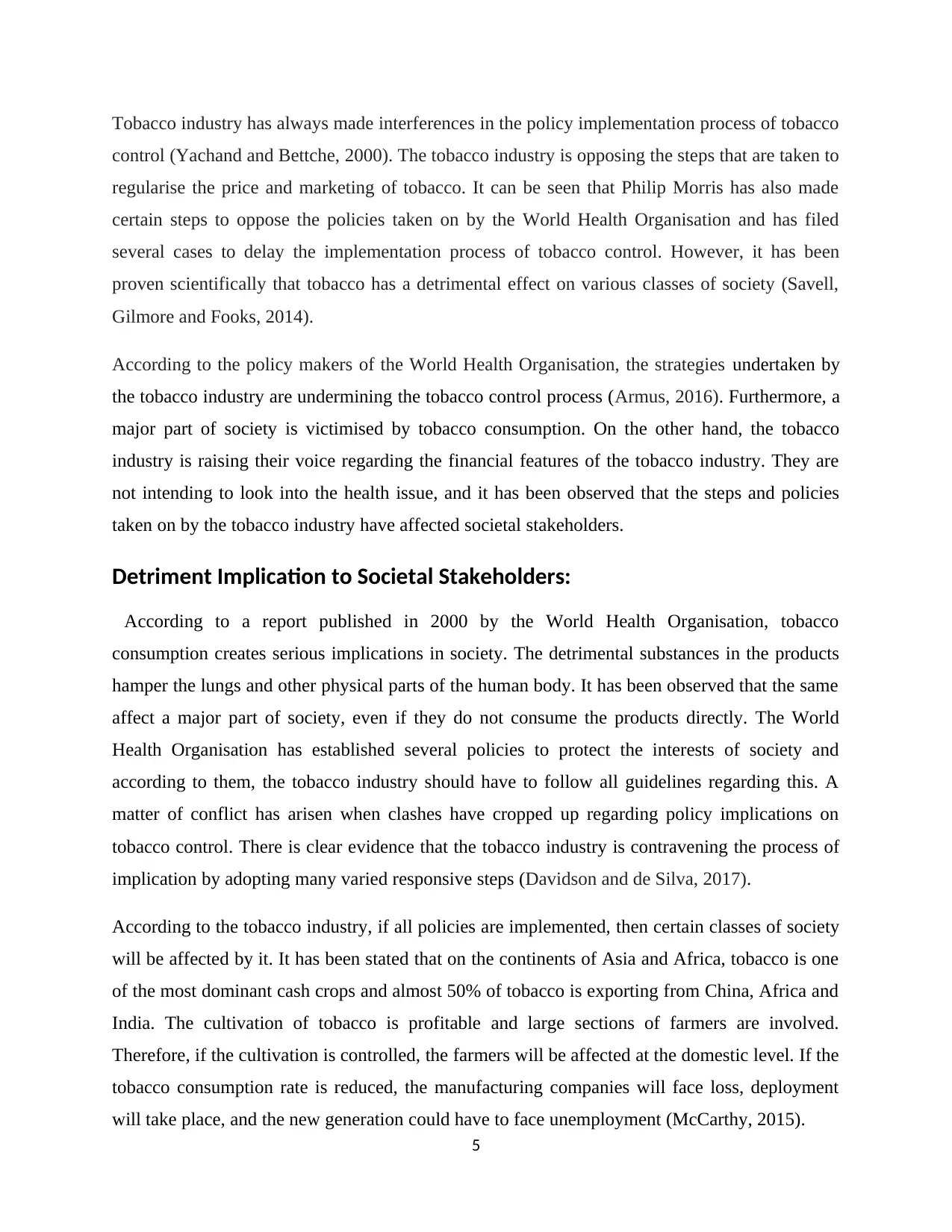
Tobacco industry has always made interferences in the policy implementation process of tobacco
control (Yachand and Bettche, 2000). The tobacco industry is opposing the steps that are taken to
regularise the price and marketing of tobacco. It can be seen that Philip Morris has also made
certain steps to oppose the policies taken on by the World Health Organisation and has filed
several cases to delay the implementation process of tobacco control. However, it has been
proven scientifically that tobacco has a detrimental effect on various classes of society (Savell,
Gilmore and Fooks, 2014).
According to the policy makers of the World Health Organisation, the strategies undertaken by
the tobacco industry are undermining the tobacco control process (Armus, 2016). Furthermore, a
major part of society is victimised by tobacco consumption. On the other hand, the tobacco
industry is raising their voice regarding the financial features of the tobacco industry. They are
not intending to look into the health issue, and it has been observed that the steps and policies
taken on by the tobacco industry have affected societal stakeholders.
Detriment Implication to Societal Stakeholders:
According to a report published in 2000 by the World Health Organisation, tobacco
consumption creates serious implications in society. The detrimental substances in the products
hamper the lungs and other physical parts of the human body. It has been observed that the same
affect a major part of society, even if they do not consume the products directly. The World
Health Organisation has established several policies to protect the interests of society and
according to them, the tobacco industry should have to follow all guidelines regarding this. A
matter of conflict has arisen when clashes have cropped up regarding policy implications on
tobacco control. There is clear evidence that the tobacco industry is contravening the process of
implication by adopting many varied responsive steps (Davidson and de Silva, 2017).
According to the tobacco industry, if all policies are implemented, then certain classes of society
will be affected by it. It has been stated that on the continents of Asia and Africa, tobacco is one
of the most dominant cash crops and almost 50% of tobacco is exporting from China, Africa and
India. The cultivation of tobacco is profitable and large sections of farmers are involved.
Therefore, if the cultivation is controlled, the farmers will be affected at the domestic level. If the
tobacco consumption rate is reduced, the manufacturing companies will face loss, deployment
will take place, and the new generation could have to face unemployment (McCarthy, 2015).
5
control (Yachand and Bettche, 2000). The tobacco industry is opposing the steps that are taken to
regularise the price and marketing of tobacco. It can be seen that Philip Morris has also made
certain steps to oppose the policies taken on by the World Health Organisation and has filed
several cases to delay the implementation process of tobacco control. However, it has been
proven scientifically that tobacco has a detrimental effect on various classes of society (Savell,
Gilmore and Fooks, 2014).
According to the policy makers of the World Health Organisation, the strategies undertaken by
the tobacco industry are undermining the tobacco control process (Armus, 2016). Furthermore, a
major part of society is victimised by tobacco consumption. On the other hand, the tobacco
industry is raising their voice regarding the financial features of the tobacco industry. They are
not intending to look into the health issue, and it has been observed that the steps and policies
taken on by the tobacco industry have affected societal stakeholders.
Detriment Implication to Societal Stakeholders:
According to a report published in 2000 by the World Health Organisation, tobacco
consumption creates serious implications in society. The detrimental substances in the products
hamper the lungs and other physical parts of the human body. It has been observed that the same
affect a major part of society, even if they do not consume the products directly. The World
Health Organisation has established several policies to protect the interests of society and
according to them, the tobacco industry should have to follow all guidelines regarding this. A
matter of conflict has arisen when clashes have cropped up regarding policy implications on
tobacco control. There is clear evidence that the tobacco industry is contravening the process of
implication by adopting many varied responsive steps (Davidson and de Silva, 2017).
According to the tobacco industry, if all policies are implemented, then certain classes of society
will be affected by it. It has been stated that on the continents of Asia and Africa, tobacco is one
of the most dominant cash crops and almost 50% of tobacco is exporting from China, Africa and
India. The cultivation of tobacco is profitable and large sections of farmers are involved.
Therefore, if the cultivation is controlled, the farmers will be affected at the domestic level. If the
tobacco consumption rate is reduced, the manufacturing companies will face loss, deployment
will take place, and the new generation could have to face unemployment (McCarthy, 2015).
5
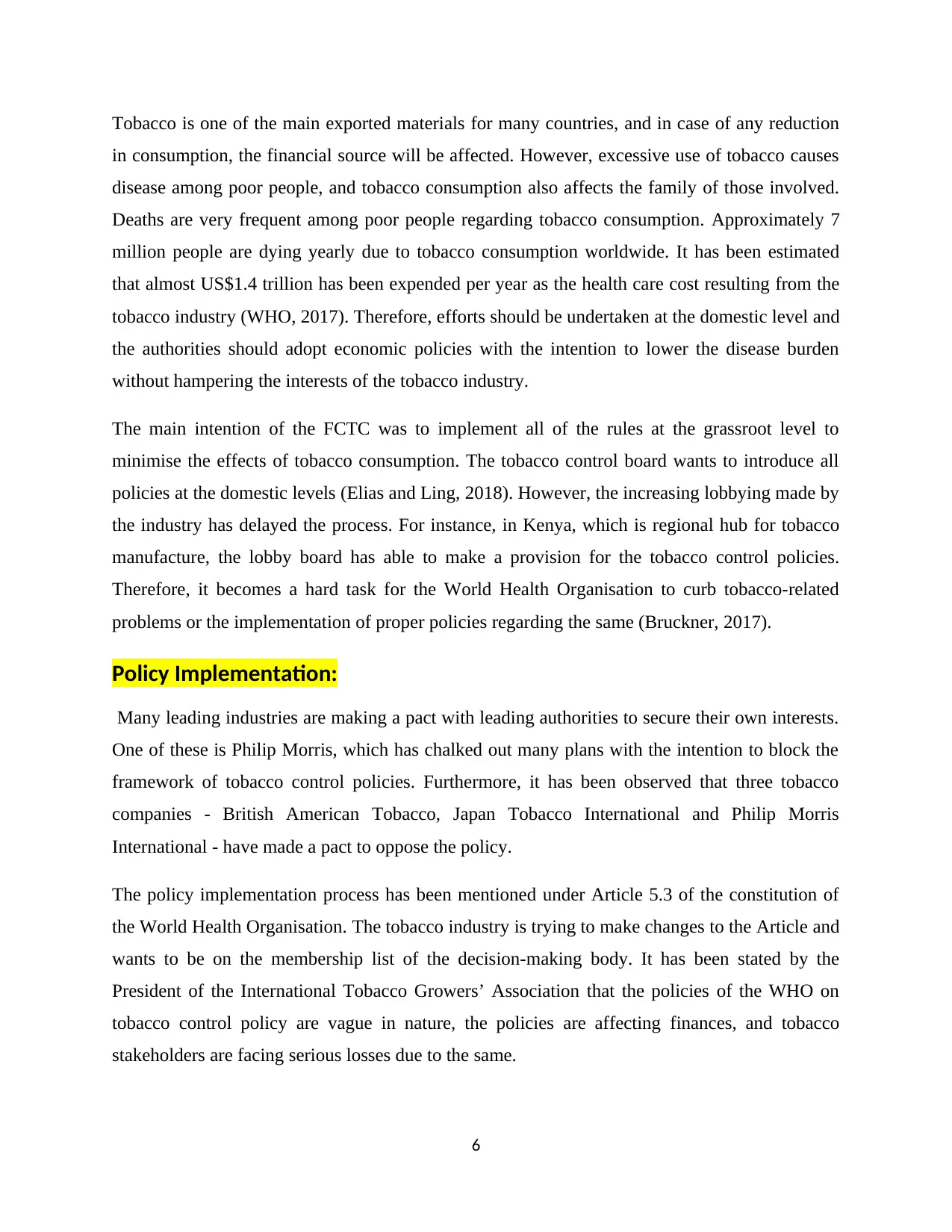
Tobacco is one of the main exported materials for many countries, and in case of any reduction
in consumption, the financial source will be affected. However, excessive use of tobacco causes
disease among poor people, and tobacco consumption also affects the family of those involved.
Deaths are very frequent among poor people regarding tobacco consumption. Approximately 7
million people are dying yearly due to tobacco consumption worldwide. It has been estimated
that almost US$1.4 trillion has been expended per year as the health care cost resulting from the
tobacco industry (WHO, 2017). Therefore, efforts should be undertaken at the domestic level and
the authorities should adopt economic policies with the intention to lower the disease burden
without hampering the interests of the tobacco industry.
The main intention of the FCTC was to implement all of the rules at the grassroot level to
minimise the effects of tobacco consumption. The tobacco control board wants to introduce all
policies at the domestic levels (Elias and Ling, 2018). However, the increasing lobbying made by
the industry has delayed the process. For instance, in Kenya, which is regional hub for tobacco
manufacture, the lobby board has able to make a provision for the tobacco control policies.
Therefore, it becomes a hard task for the World Health Organisation to curb tobacco-related
problems or the implementation of proper policies regarding the same (Bruckner, 2017).
Policy Implementation:
Many leading industries are making a pact with leading authorities to secure their own interests.
One of these is Philip Morris, which has chalked out many plans with the intention to block the
framework of tobacco control policies. Furthermore, it has been observed that three tobacco
companies - British American Tobacco, Japan Tobacco International and Philip Morris
International - have made a pact to oppose the policy.
The policy implementation process has been mentioned under Article 5.3 of the constitution of
the World Health Organisation. The tobacco industry is trying to make changes to the Article and
wants to be on the membership list of the decision-making body. It has been stated by the
President of the International Tobacco Growers’ Association that the policies of the WHO on
tobacco control policy are vague in nature, the policies are affecting finances, and tobacco
stakeholders are facing serious losses due to the same.
6
in consumption, the financial source will be affected. However, excessive use of tobacco causes
disease among poor people, and tobacco consumption also affects the family of those involved.
Deaths are very frequent among poor people regarding tobacco consumption. Approximately 7
million people are dying yearly due to tobacco consumption worldwide. It has been estimated
that almost US$1.4 trillion has been expended per year as the health care cost resulting from the
tobacco industry (WHO, 2017). Therefore, efforts should be undertaken at the domestic level and
the authorities should adopt economic policies with the intention to lower the disease burden
without hampering the interests of the tobacco industry.
The main intention of the FCTC was to implement all of the rules at the grassroot level to
minimise the effects of tobacco consumption. The tobacco control board wants to introduce all
policies at the domestic levels (Elias and Ling, 2018). However, the increasing lobbying made by
the industry has delayed the process. For instance, in Kenya, which is regional hub for tobacco
manufacture, the lobby board has able to make a provision for the tobacco control policies.
Therefore, it becomes a hard task for the World Health Organisation to curb tobacco-related
problems or the implementation of proper policies regarding the same (Bruckner, 2017).
Policy Implementation:
Many leading industries are making a pact with leading authorities to secure their own interests.
One of these is Philip Morris, which has chalked out many plans with the intention to block the
framework of tobacco control policies. Furthermore, it has been observed that three tobacco
companies - British American Tobacco, Japan Tobacco International and Philip Morris
International - have made a pact to oppose the policy.
The policy implementation process has been mentioned under Article 5.3 of the constitution of
the World Health Organisation. The tobacco industry is trying to make changes to the Article and
wants to be on the membership list of the decision-making body. It has been stated by the
President of the International Tobacco Growers’ Association that the policies of the WHO on
tobacco control policy are vague in nature, the policies are affecting finances, and tobacco
stakeholders are facing serious losses due to the same.
6
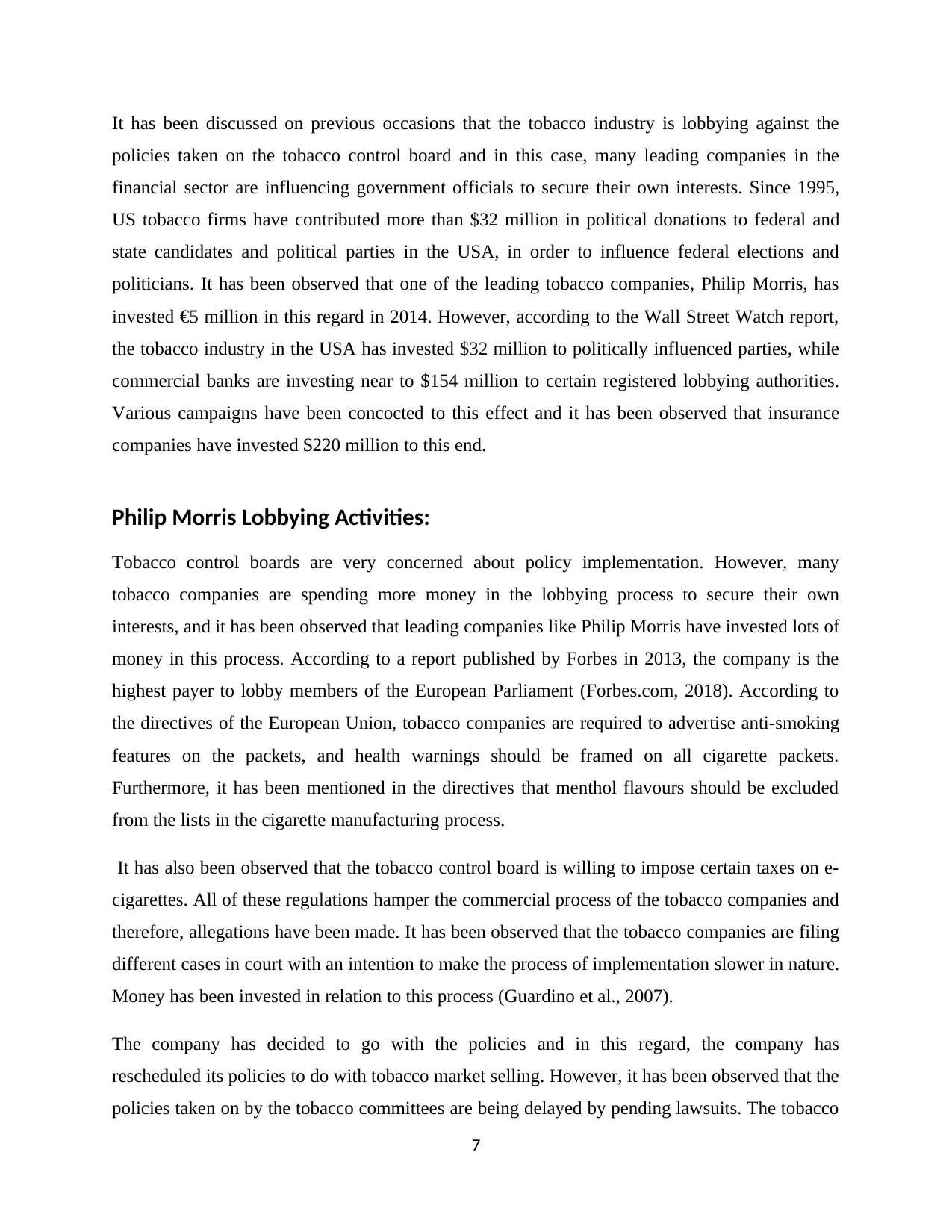
It has been discussed on previous occasions that the tobacco industry is lobbying against the
policies taken on the tobacco control board and in this case, many leading companies in the
financial sector are influencing government officials to secure their own interests. Since 1995,
US tobacco firms have contributed more than $32 million in political donations to federal and
state candidates and political parties in the USA, in order to influence federal elections and
politicians. It has been observed that one of the leading tobacco companies, Philip Morris, has
invested €5 million in this regard in 2014. However, according to the Wall Street Watch report,
the tobacco industry in the USA has invested $32 million to politically influenced parties, while
commercial banks are investing near to $154 million to certain registered lobbying authorities.
Various campaigns have been concocted to this effect and it has been observed that insurance
companies have invested $220 million to this end.
Philip Morris Lobbying Activities:
Tobacco control boards are very concerned about policy implementation. However, many
tobacco companies are spending more money in the lobbying process to secure their own
interests, and it has been observed that leading companies like Philip Morris have invested lots of
money in this process. According to a report published by Forbes in 2013, the company is the
highest payer to lobby members of the European Parliament (Forbes.com, 2018). According to
the directives of the European Union, tobacco companies are required to advertise anti-smoking
features on the packets, and health warnings should be framed on all cigarette packets.
Furthermore, it has been mentioned in the directives that menthol flavours should be excluded
from the lists in the cigarette manufacturing process.
It has also been observed that the tobacco control board is willing to impose certain taxes on e-
cigarettes. All of these regulations hamper the commercial process of the tobacco companies and
therefore, allegations have been made. It has been observed that the tobacco companies are filing
different cases in court with an intention to make the process of implementation slower in nature.
Money has been invested in relation to this process (Guardino et al., 2007).
The company has decided to go with the policies and in this regard, the company has
rescheduled its policies to do with tobacco market selling. However, it has been observed that the
policies taken on by the tobacco committees are being delayed by pending lawsuits. The tobacco
7
policies taken on the tobacco control board and in this case, many leading companies in the
financial sector are influencing government officials to secure their own interests. Since 1995,
US tobacco firms have contributed more than $32 million in political donations to federal and
state candidates and political parties in the USA, in order to influence federal elections and
politicians. It has been observed that one of the leading tobacco companies, Philip Morris, has
invested €5 million in this regard in 2014. However, according to the Wall Street Watch report,
the tobacco industry in the USA has invested $32 million to politically influenced parties, while
commercial banks are investing near to $154 million to certain registered lobbying authorities.
Various campaigns have been concocted to this effect and it has been observed that insurance
companies have invested $220 million to this end.
Philip Morris Lobbying Activities:
Tobacco control boards are very concerned about policy implementation. However, many
tobacco companies are spending more money in the lobbying process to secure their own
interests, and it has been observed that leading companies like Philip Morris have invested lots of
money in this process. According to a report published by Forbes in 2013, the company is the
highest payer to lobby members of the European Parliament (Forbes.com, 2018). According to
the directives of the European Union, tobacco companies are required to advertise anti-smoking
features on the packets, and health warnings should be framed on all cigarette packets.
Furthermore, it has been mentioned in the directives that menthol flavours should be excluded
from the lists in the cigarette manufacturing process.
It has also been observed that the tobacco control board is willing to impose certain taxes on e-
cigarettes. All of these regulations hamper the commercial process of the tobacco companies and
therefore, allegations have been made. It has been observed that the tobacco companies are filing
different cases in court with an intention to make the process of implementation slower in nature.
Money has been invested in relation to this process (Guardino et al., 2007).
The company has decided to go with the policies and in this regard, the company has
rescheduled its policies to do with tobacco market selling. However, it has been observed that the
policies taken on by the tobacco committees are being delayed by pending lawsuits. The tobacco
7
Paraphrase This Document
Need a fresh take? Get an instant paraphrase of this document with our AI Paraphraser
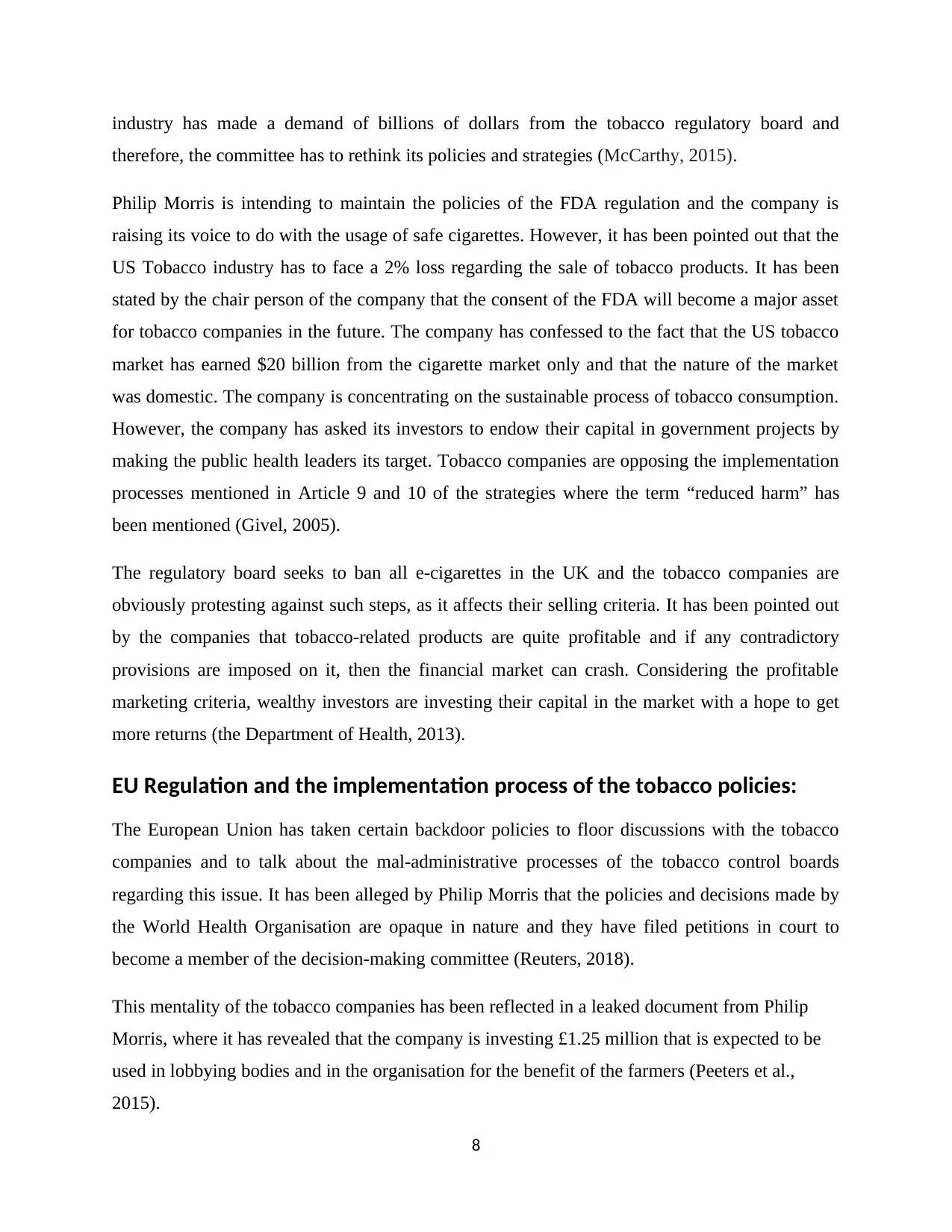
industry has made a demand of billions of dollars from the tobacco regulatory board and
therefore, the committee has to rethink its policies and strategies (McCarthy, 2015).
Philip Morris is intending to maintain the policies of the FDA regulation and the company is
raising its voice to do with the usage of safe cigarettes. However, it has been pointed out that the
US Tobacco industry has to face a 2% loss regarding the sale of tobacco products. It has been
stated by the chair person of the company that the consent of the FDA will become a major asset
for tobacco companies in the future. The company has confessed to the fact that the US tobacco
market has earned $20 billion from the cigarette market only and that the nature of the market
was domestic. The company is concentrating on the sustainable process of tobacco consumption.
However, the company has asked its investors to endow their capital in government projects by
making the public health leaders its target. Tobacco companies are opposing the implementation
processes mentioned in Article 9 and 10 of the strategies where the term “reduced harm” has
been mentioned (Givel, 2005).
The regulatory board seeks to ban all e-cigarettes in the UK and the tobacco companies are
obviously protesting against such steps, as it affects their selling criteria. It has been pointed out
by the companies that tobacco-related products are quite profitable and if any contradictory
provisions are imposed on it, then the financial market can crash. Considering the profitable
marketing criteria, wealthy investors are investing their capital in the market with a hope to get
more returns (the Department of Health, 2013).
EU Regulation and the implementation process of the tobacco policies:
The European Union has taken certain backdoor policies to floor discussions with the tobacco
companies and to talk about the mal-administrative processes of the tobacco control boards
regarding this issue. It has been alleged by Philip Morris that the policies and decisions made by
the World Health Organisation are opaque in nature and they have filed petitions in court to
become a member of the decision-making committee (Reuters, 2018).
This mentality of the tobacco companies has been reflected in a leaked document from Philip
Morris, where it has revealed that the company is investing £1.25 million that is expected to be
used in lobbying bodies and in the organisation for the benefit of the farmers (Peeters et al.,
2015).
8
therefore, the committee has to rethink its policies and strategies (McCarthy, 2015).
Philip Morris is intending to maintain the policies of the FDA regulation and the company is
raising its voice to do with the usage of safe cigarettes. However, it has been pointed out that the
US Tobacco industry has to face a 2% loss regarding the sale of tobacco products. It has been
stated by the chair person of the company that the consent of the FDA will become a major asset
for tobacco companies in the future. The company has confessed to the fact that the US tobacco
market has earned $20 billion from the cigarette market only and that the nature of the market
was domestic. The company is concentrating on the sustainable process of tobacco consumption.
However, the company has asked its investors to endow their capital in government projects by
making the public health leaders its target. Tobacco companies are opposing the implementation
processes mentioned in Article 9 and 10 of the strategies where the term “reduced harm” has
been mentioned (Givel, 2005).
The regulatory board seeks to ban all e-cigarettes in the UK and the tobacco companies are
obviously protesting against such steps, as it affects their selling criteria. It has been pointed out
by the companies that tobacco-related products are quite profitable and if any contradictory
provisions are imposed on it, then the financial market can crash. Considering the profitable
marketing criteria, wealthy investors are investing their capital in the market with a hope to get
more returns (the Department of Health, 2013).
EU Regulation and the implementation process of the tobacco policies:
The European Union has taken certain backdoor policies to floor discussions with the tobacco
companies and to talk about the mal-administrative processes of the tobacco control boards
regarding this issue. It has been alleged by Philip Morris that the policies and decisions made by
the World Health Organisation are opaque in nature and they have filed petitions in court to
become a member of the decision-making committee (Reuters, 2018).
This mentality of the tobacco companies has been reflected in a leaked document from Philip
Morris, where it has revealed that the company is investing £1.25 million that is expected to be
used in lobbying bodies and in the organisation for the benefit of the farmers (Peeters et al.,
2015).
8
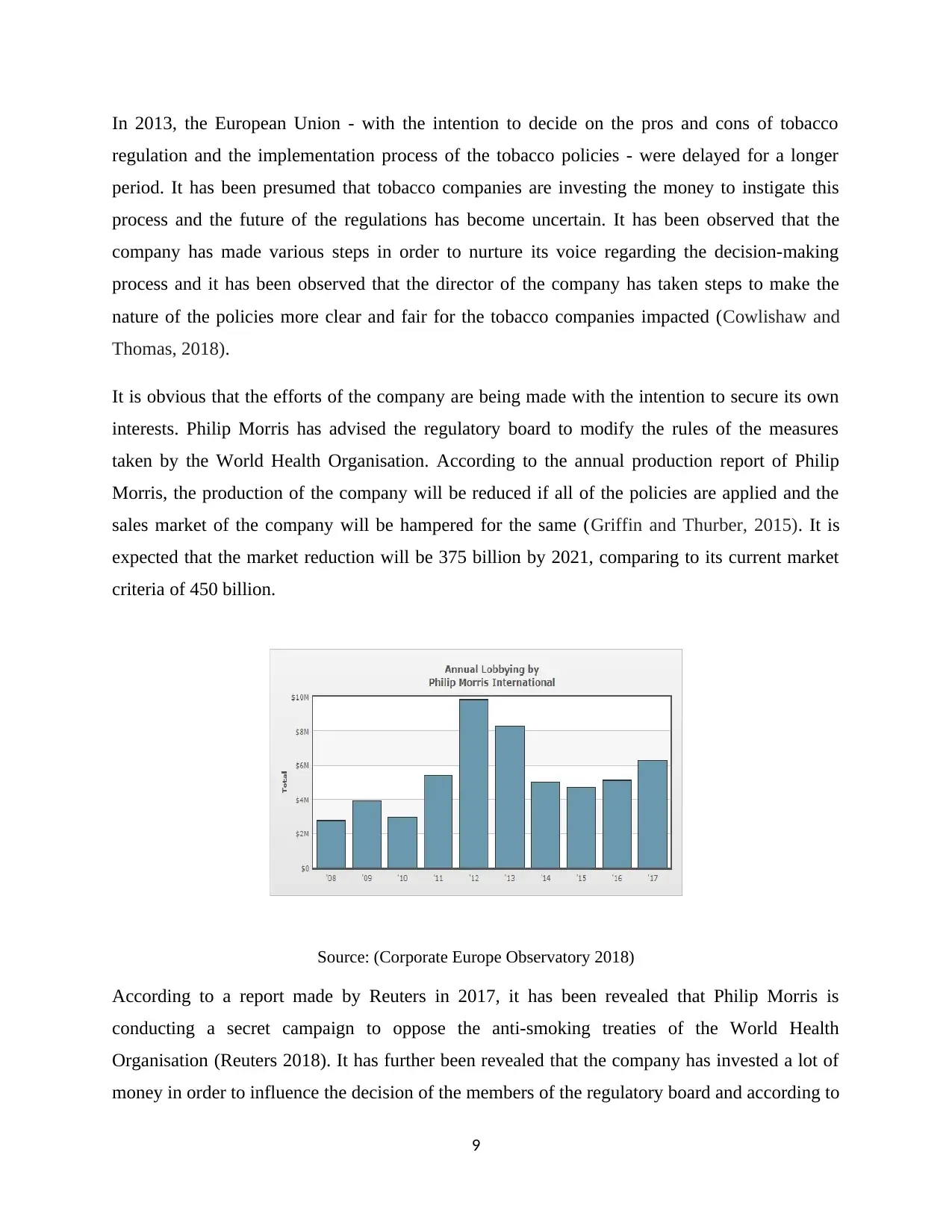
In 2013, the European Union - with the intention to decide on the pros and cons of tobacco
regulation and the implementation process of the tobacco policies - were delayed for a longer
period. It has been presumed that tobacco companies are investing the money to instigate this
process and the future of the regulations has become uncertain. It has been observed that the
company has made various steps in order to nurture its voice regarding the decision-making
process and it has been observed that the director of the company has taken steps to make the
nature of the policies more clear and fair for the tobacco companies impacted (Cowlishaw and
Thomas, 2018).
It is obvious that the efforts of the company are being made with the intention to secure its own
interests. Philip Morris has advised the regulatory board to modify the rules of the measures
taken by the World Health Organisation. According to the annual production report of Philip
Morris, the production of the company will be reduced if all of the policies are applied and the
sales market of the company will be hampered for the same (Griffin and Thurber, 2015). It is
expected that the market reduction will be 375 billion by 2021, comparing to its current market
criteria of 450 billion.
Source: (Corporate Europe Observatory 2018)
According to a report made by Reuters in 2017, it has been revealed that Philip Morris is
conducting a secret campaign to oppose the anti-smoking treaties of the World Health
Organisation (Reuters 2018). It has further been revealed that the company has invested a lot of
money in order to influence the decision of the members of the regulatory board and according to
9
regulation and the implementation process of the tobacco policies - were delayed for a longer
period. It has been presumed that tobacco companies are investing the money to instigate this
process and the future of the regulations has become uncertain. It has been observed that the
company has made various steps in order to nurture its voice regarding the decision-making
process and it has been observed that the director of the company has taken steps to make the
nature of the policies more clear and fair for the tobacco companies impacted (Cowlishaw and
Thomas, 2018).
It is obvious that the efforts of the company are being made with the intention to secure its own
interests. Philip Morris has advised the regulatory board to modify the rules of the measures
taken by the World Health Organisation. According to the annual production report of Philip
Morris, the production of the company will be reduced if all of the policies are applied and the
sales market of the company will be hampered for the same (Griffin and Thurber, 2015). It is
expected that the market reduction will be 375 billion by 2021, comparing to its current market
criteria of 450 billion.
Source: (Corporate Europe Observatory 2018)
According to a report made by Reuters in 2017, it has been revealed that Philip Morris is
conducting a secret campaign to oppose the anti-smoking treaties of the World Health
Organisation (Reuters 2018). It has further been revealed that the company has invested a lot of
money in order to influence the decision of the members of the regulatory board and according to
9
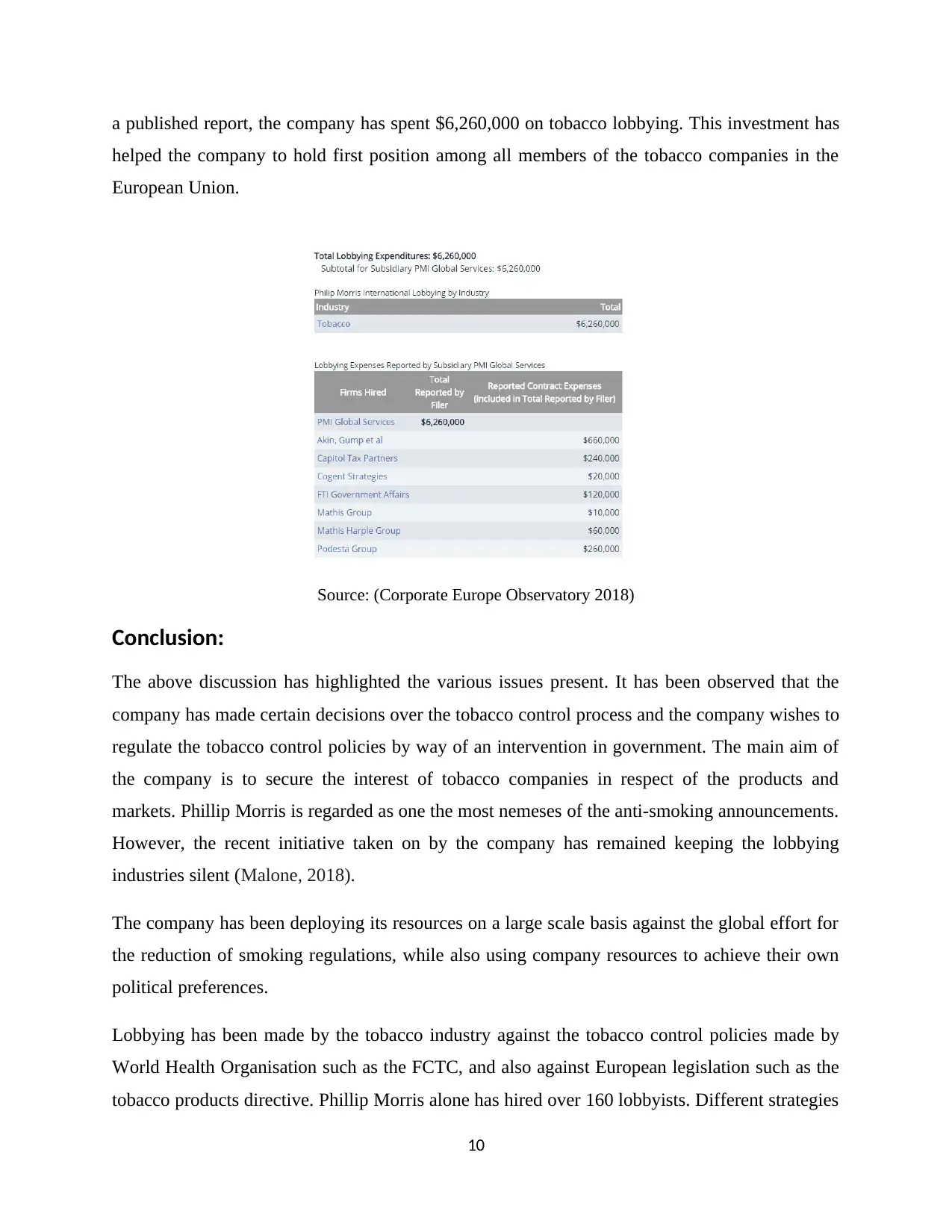
a published report, the company has spent $6,260,000 on tobacco lobbying. This investment has
helped the company to hold first position among all members of the tobacco companies in the
European Union.
Source: (Corporate Europe Observatory 2018)
Conclusion:
The above discussion has highlighted the various issues present. It has been observed that the
company has made certain decisions over the tobacco control process and the company wishes to
regulate the tobacco control policies by way of an intervention in government. The main aim of
the company is to secure the interest of tobacco companies in respect of the products and
markets. Phillip Morris is regarded as one the most nemeses of the anti-smoking announcements.
However, the recent initiative taken on by the company has remained keeping the lobbying
industries silent (Malone, 2018).
The company has been deploying its resources on a large scale basis against the global effort for
the reduction of smoking regulations, while also using company resources to achieve their own
political preferences.
Lobbying has been made by the tobacco industry against the tobacco control policies made by
World Health Organisation such as the FCTC, and also against European legislation such as the
tobacco products directive. Phillip Morris alone has hired over 160 lobbyists. Different strategies
10
helped the company to hold first position among all members of the tobacco companies in the
European Union.
Source: (Corporate Europe Observatory 2018)
Conclusion:
The above discussion has highlighted the various issues present. It has been observed that the
company has made certain decisions over the tobacco control process and the company wishes to
regulate the tobacco control policies by way of an intervention in government. The main aim of
the company is to secure the interest of tobacco companies in respect of the products and
markets. Phillip Morris is regarded as one the most nemeses of the anti-smoking announcements.
However, the recent initiative taken on by the company has remained keeping the lobbying
industries silent (Malone, 2018).
The company has been deploying its resources on a large scale basis against the global effort for
the reduction of smoking regulations, while also using company resources to achieve their own
political preferences.
Lobbying has been made by the tobacco industry against the tobacco control policies made by
World Health Organisation such as the FCTC, and also against European legislation such as the
tobacco products directive. Phillip Morris alone has hired over 160 lobbyists. Different strategies
10
Secure Best Marks with AI Grader
Need help grading? Try our AI Grader for instant feedback on your assignments.
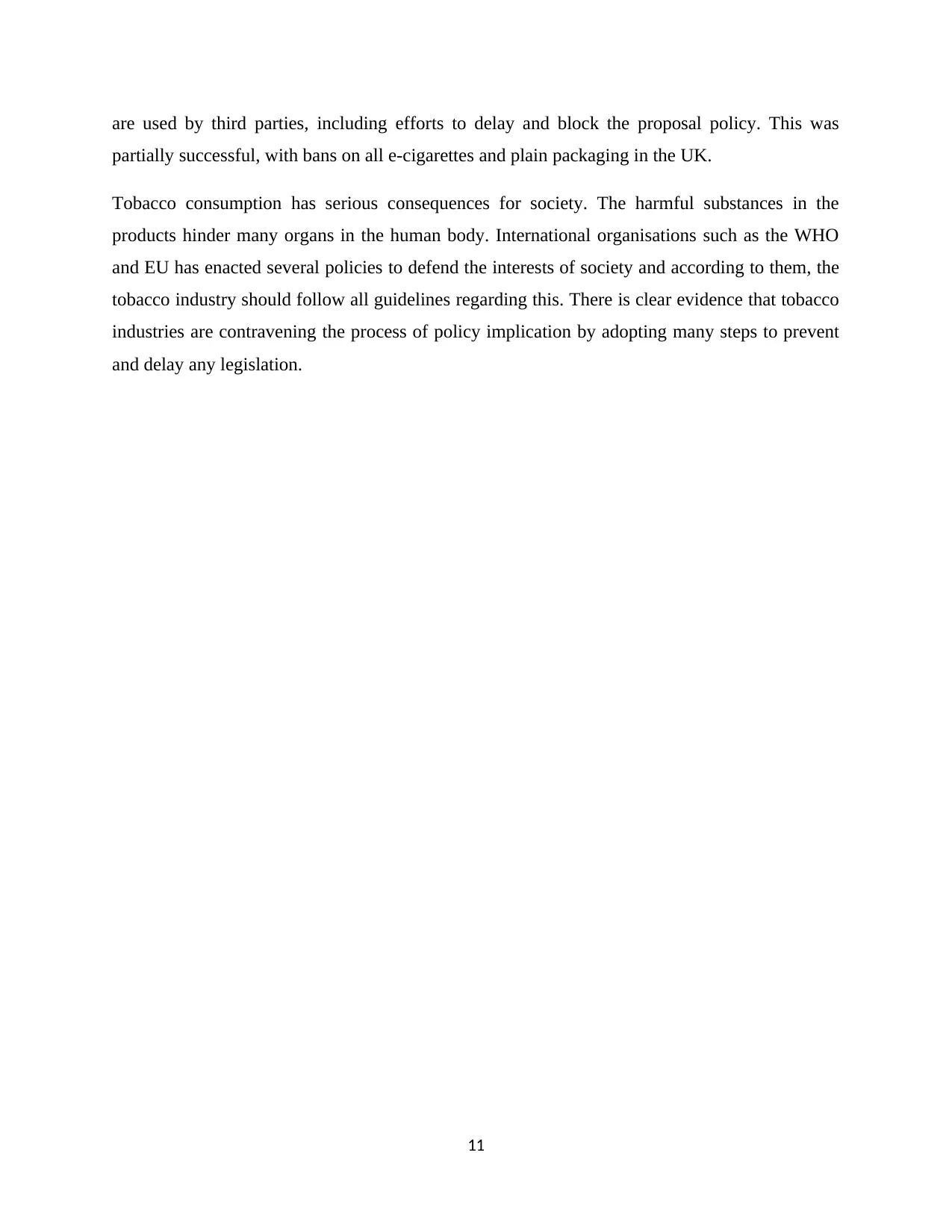
are used by third parties, including efforts to delay and block the proposal policy. This was
partially successful, with bans on all e-cigarettes and plain packaging in the UK.
Tobacco consumption has serious consequences for society. The harmful substances in the
products hinder many organs in the human body. International organisations such as the WHO
and EU has enacted several policies to defend the interests of society and according to them, the
tobacco industry should follow all guidelines regarding this. There is clear evidence that tobacco
industries are contravening the process of policy implication by adopting many steps to prevent
and delay any legislation.
11
partially successful, with bans on all e-cigarettes and plain packaging in the UK.
Tobacco consumption has serious consequences for society. The harmful substances in the
products hinder many organs in the human body. International organisations such as the WHO
and EU has enacted several policies to defend the interests of society and according to them, the
tobacco industry should follow all guidelines regarding this. There is clear evidence that tobacco
industries are contravening the process of policy implication by adopting many steps to prevent
and delay any legislation.
11
1 out of 11
Related Documents
Your All-in-One AI-Powered Toolkit for Academic Success.
+13062052269
info@desklib.com
Available 24*7 on WhatsApp / Email
![[object Object]](/_next/static/media/star-bottom.7253800d.svg)
Unlock your academic potential
© 2024 | Zucol Services PVT LTD | All rights reserved.




